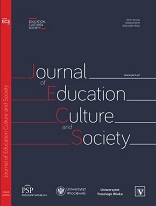A lesson design of the subject of local cuisine as a course unit in language teaching
A lesson design of the subject of local cuisine as a course unit in language teaching
Author(s): Hasan CoşkunSubject(s): Social Sciences, Education, Foreign languages learning, Higher Education
Published by: Fundacja Pro Scientia Publica
Summary/Abstract: Aim. In Turkey, German ranks second after English as a foreign language in private courses, schools, and universities. There is an important relation between the selection of the subject of German courses, i.e., the detailed planning of the courses, and the implementation of the appropriate method. In this research, the subject of cuisine was planned for teaching German at universities. The purpose of this research is the preparation, implementation and evaluation of a sample lesson focused on the selection of the subject of cuisine for German courses taught in the universities. Methods. This research on cuisine was qualitative in nature. The document analysis technique was used in the research (Kuş, 2007; Yıldırım & Şimşek, 2008). During the 2018/2019 academic year the researcher taught on the subject of cuisine selection in his German courses. The implementation and evaluation of the subject of cuisine are developed by Hasan Coşkun (2020) in accordance with the lesson planning model previously prepared. The materials used in this lesson are prepared according to the model developed by Coşkun (2020). The unit on cuisine has been revised for this article. Result and Conclusion. The success of the lesson planning model mentioned in this article was also observed in the activities conducted earlier. It was also seen that the students who attended German courses in connection with education or work in Germany, Austria, and Switzerland exerted efforts in establishing contact with the instructor and with other students attending the class. It was observed that participants talked about the Turkish, German, and Chinese cuisine in their families, peer groups, restaurants, and snack bars. In addition to the subject discussed in the class, the method implemented in the lesson and the planning of the course according to the method, play an important role in the continuation of the students’ interest. Therefore, effective lesson planning models should be developed. This lesson model is also applicable to other languages. Originality. German is offered as a foreign language in Turkish schools in the second grade. Consequently, German is usually chosen as a second foreign language after English. Students from all the departments of the university may attend the elective German language classes to study or work in Germany. The condition for participation in the courses “German for Erasmus” and “German for Communication,” taught by the researcher, aims to prepare the students to read and speak German at the A2 level. It is frequently observed that the participants speak German at different levels. The overseas experience of the participants, the level of their German and their knowledge of other languages play an important role in this respect. In recent years, the number of course participants from Germany and other countries have increased. The students who had been in German speaking countries within the Erasmus program participate in German courses to maintain their fluency in the German language. To conduct the courses effectively, a suitable method should be developed and such an approach will help the participants who come from different countries and students with different levels of fluency. It is believed that this inter-disciplinary research will contribute to the use of the active method during German lessons.
Journal: The Journal of Education, Culture, and Society
- Issue Year: 12/2021
- Issue No: 1
- Page Range: 479-503
- Page Count: 25
- Language: English

